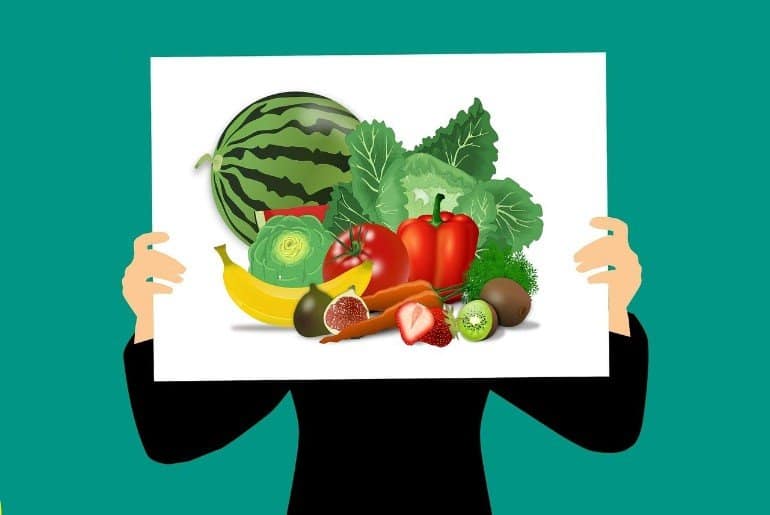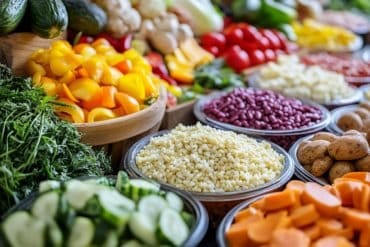Summary: People who consumed 470 grams of fruits and vegetables per day had 10% lower levels of stress than those who ate 230 grams of fresh produce a day.
Source: Edith Cowan University
Eating a diet rich in fruit and vegetables is associated with less stress, according to new research from Edith Cowan University (ECU).
The study examined the link between fruit and vegetable intake and stress levels of more than 8,600 Australians aged between 25 and 91 participating in the Australian Diabetes, Obesity and Lifestyle (AusDiab) Study from Baker Heart and Diabetes Institute.
The findings revealed people who ate at least 470 grams of fruit and vegetables daily had 10 percent lower stress levels than those who consumed less than 230 grams. The World Health Organization (WHO) recommends eating at least 400 grams of fruit and vegetables per day.
Lead researcher, PhD candidate Simone Radavelli-Bagatini from ECU’s Institute for Nutrition Research, said the study strengthens the link between diets rich in fruit and vegetables and mental wellbeing.
“We found that people who have higher fruit and veggie intakes are less stressed than those with lower intakes, which suggests diet plays a key role in mental wellbeing,” said Ms Radavelli-Bagatini.
A growing issue
Mental health conditions are an increasing problem in Australia and around the world. Around one in two Australians will experience a mental health issue in their lifetime. Globally, approximately 1 in 10 people live with a mental health disorder.
According to Ms Radavelli-Bagatini, some stress is considered normal, but long-term exposure can significantly impact mental health.
“Long-term and unmanaged stress can lead to a range of health problems including heart disease, diabetes, depression and anxiety so we need to find ways to prevent and possibly alleviate mental health problems in the future,” said Ms Radavelli-Bagatini.
The benefits of a healthy diet are well known, but only 1 in 2 Australians eat the recommended two serves of fruit per day and fewer than 1 in 10 eat the recommended five serves of vegetables each day.

“Previous studies have shown the link between fruit and vegetable consumption and stress in younger adults, but this is the first time we’re seeing similar results across adults of all ages,” said Ms Radavelli-Bagatini.
“The study’s findings emphasise that it’s important for people to have a diet rich in fruit and vegetables to potentially minimise stress.”
Food and mood
While the mechanisms behind how fruit and vegetable consumption influences stress are still unclear, Ms Radavelli-Bagatini said key nutrients could be a factor.
“Vegetables and fruits contain important nutrients such as vitamins, minerals, flavonoids and carotenoids that can reduce inflammation and oxidative stress, and therefore improve mental wellbeing,” she said.
“Inflammation and oxidative stress in the body are recognised factors that can lead to increased stress, anxiety and lower mood.”
“These findings encourage more research into diet and specifically what fruits and vegetables provide the most benefits for mental health.”
The research is part of ECU’s recently launched Institute for Nutrition Research, which aims to investigate how nutrition can help prevent and treat chronic health conditions.
‘Fruit and vegetable intake is inversely associated with perceived stress across the adult lifespan’ was published in Clinical Nutrition.
About this diet and stress research news
Source: Edith Cowan University
Contact: Press Office – Edith Cowan University
Image: The image is in the public domain
Original Research: Closed access.
“Fruit and vegetable intake is inversely associated with perceived stress across the adult lifespan” by Simone Radavelli-Bagatini, Lauren C. Blekkenhorst, Marc Sim, Richard L. Prince, Nicola P. Bondonno, Catherine P. Bondonno, Richard Woodman, Reindolf Anokye, James Dimmock, Ben Jackson, Leesa Costello, Amanda Devine, Mandy J. Stanley, Joanne M. Dickson, Dianna J. Magliano, Jonathan E. Shaw, Robin M. Daly, Jonathan M. Hodgson, Joshua R. Lewis. Clinical Nutrition
Abstract
Fruit and vegetable intake is inversely associated with perceived stress across the adult lifespan
Background & aims
Poor nutritional habits are linked to higher perceived stress, but the relationship between fruit and vegetable (FV) intake and stress is uncertain. The primary aim of this cross-sectional study was to explore the relationship between FV intake and perceived stress in a population-based cohort of men and women aged ≥25 years from the Australian Diabetes, Obesity and Lifestyle (AusDiab) Study. A secondary aim was to investigate the relationship between serum carotenoids, biomarkers of FV intake, and perceived stress.
Methods
In Australian men and women, dietary intake was assessed using a Food Frequency Questionnaire in 1999–2000 (n = 8689). Perceived stress was assessed using a validated Perceived Stress Questionnaire [PSQ index values ranging from 0 (lowest) to 1 (highest)]. Serum carotenoids were measured in a subset of participants (n = 1187) using high-performance liquid chromatography. Multivariable-adjusted linear and logistic regression were performed to investigate the associations between FV intake and perceived stress.
Results
Mean age of participants was 47.4 (SD 14.1) years (49.8% females). Participants with the highest intakes of FV had 10% lower PSQ index values than those with the lowest intake [Q4: 0.27 ± 0.004 vs. Q1: 0.30 ± 0.004 (mean ± SE), p = 0.004]. Similar associations were found for fruits and vegetables, analysed separately. In subgroup analyses higher FV intake was associated with lower perceived stress in the middle-aged adults [≥45-<65 years (p = 0.004)], but not in the younger (<45 years) and older participants (≥65 years). Higher FV intake was also significantly associated with lower perceived stress in men (p = 0.009) and women (p = 0.012), separately. Serum carotenoid levels were inversely associated with perceived stress before, but not after adjusting for age and other confounding factors.
Conclusion
In Australian adults, higher FV intake was associated with lower perceived stress, particularly in the middle-aged adults. These findings support current recommendations that fruit and vegetables are essential for health and well-being.






